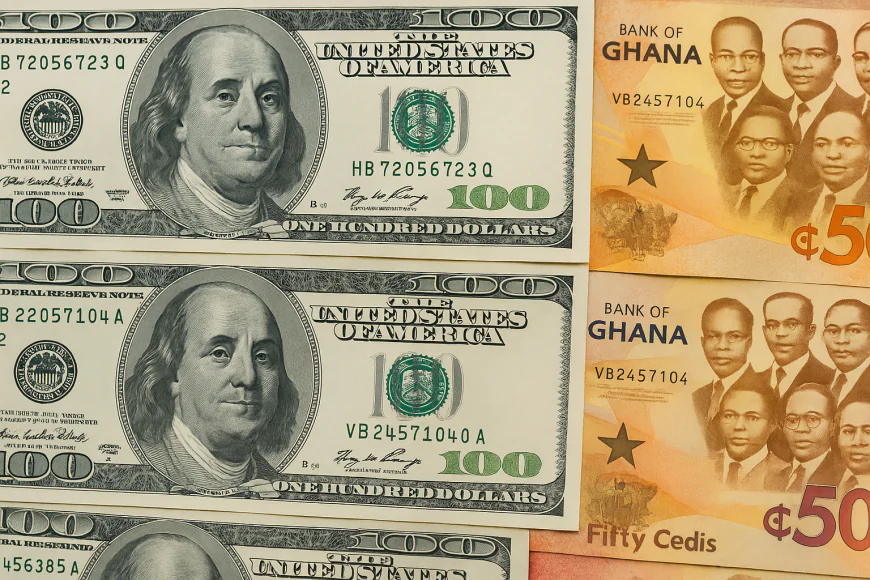Dollar Losing Value? Good News for Ghana!” – 5 Economic Benefits You Can’t Ignore
Is the falling dollar bad for Ghana? Not entirely! A stronger cedi means lower transport costs, reduced inflation, and economic relief for many. Here’s why this shift has long-term benefits.

The recent depreciation of the US dollar against the Ghanaian cedi has sparked mixed reactions among businesses and citizens. While importers and those who trade in dollars lament the decline in their dollar holdings' value, others—especially consumers and local businesses are beginning to see the positive effects. The most notable change so far has been a 15% reduction in transport fares, providing immediate relief to commuters.
Although not everyone benefits equally from this shift, the dollar's depreciation presents several economic advantages for Ghana. From lower import costs to reduced inflation and improved purchasing power for citizens, the weaker dollar strengthens the cedi in ways that can stimulate broader economic growth.
1. Cheaper Fuel and Reduced Transport Costs
One of the most immediate benefits of the cedi's appreciation is the reduction in fuel prices. Since Ghana imports petroleum products, a stronger cedi means lower fuel costs in local currency terms. This directly translates to reduced transport fares, as seen in the recent 15% drop announced by transport operators.
For the average Ghanaian, this means more disposable income. Workers who spend a significant portion of their earnings on transportation can now allocate those savings to other essential needs, boosting household welfare. Businesses that rely on logistics and transportation also benefit from lower operational costs, which can lead to more competitive pricing for goods and services.
2. Lower Import Costs and Reduced Inflation
Ghana is highly dependent on imports for essential goods, including food, machinery, and pharmaceuticals. A stronger cedi reduces the cost of these imports, leading to lower prices for consumers. This helps curb inflation, which has been a major challenge for the economy in recent years.
When inflation slows down, the purchasing power of the cedi improves. This means Ghanaians can buy more with the same amount of money, improving living standards. Additionally, businesses that rely on imported raw materials can produce goods at lower costs, potentially increasing profit margins or passing savings on to consumers.
3. Relief on External Debt Servicing
Ghana’s external debt is denominated largely in dollars. A stronger cedi means the government spends fewer cedis to service the same amount of dollar-denominated debt. This eases pressure on national reserves and could free up funds for critical public projects in infrastructure, healthcare, and education.
For businesses with dollar-denominated loans, repayment becomes less burdensome in cedi terms. This can improve corporate financial health, allowing companies to reinvest in expansion and job creation rather than struggling with high debt repayments.
4. Boost for Local Industries and Export Competitiveness
While dollar traders and import-focused businesses may suffer, local manufacturers and exporters stand to gain. A stronger cedi makes Ghanaian exports more competitive in international markets because foreign buyers need fewer dollars to purchase Ghanaian goods.
Industries such as cocoa, gold, and horticulture could see increased demand, leading to higher revenues and job creation. Additionally, local producers who compete with imported goods may find it easier to attract consumers, as the price gap between imports and locally manufactured products narrows.
5. Increased Foreign Investor Confidence
A stable and appreciating cedi signals economic recovery and can attract foreign investors. When investors see that the local currency is holding its value against the dollar, they are more likely to inject capital into the economy, whether through direct investments, stocks, or bonds.
This influx of foreign exchange can further stabilize the cedi and create more business opportunities, leading to job creation and economic growth.
Addressing the Concerns of Dollar Traders
It is understandable that those who trade or hold dollars are feeling the pinch. Individuals and businesses that rely on dollar-denominated transactions, such as importers and forex traders, are seeing reduced profits. However, it’s important to recognize that currency fluctuations are a natural part of global economics, and diversification can help mitigate risks.
The government and financial institutions should consider policies that support affected businesses, such as access to hedging instruments or favorable credit facilities to ease the transition.
Conclusion: A Balanced Perspective
While the depreciation of the dollar against the cedi does not benefit everyone equally, its overall impact on the Ghanaian economy is largely positive. From reduced transport costs and lower inflation to improved debt management and export growth, the stronger cedi provides much-needed relief to consumers and local businesses.
Rather than focusing solely on the short-term challenges faced by dollar-dependent traders, Ghanaians should also recognize the broader economic advantages. A stronger cedi, if sustained, can lead to long-term stability, improved living standards, and a more resilient economy.
The key now is for policymakers to ensure that these gains translate into sustainable growth by supporting local industries, maintaining fiscal discipline, and implementing measures that protect both businesses and consumers from future currency volatility.
In the end, while not everyone wins in a currency shift, the current trend presents an opportunity for Ghana to strengthen its economic foundations for the benefit of the majority.


